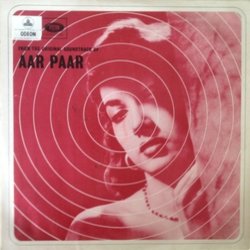
Burman, Ghulam Mohammed and O P Nayyar used her as the prime female vocalist in the early phase of their careers. Soon all the leading composers started recording in Shamshad’s voice. That was the time when Amirbai Karnataki was considered the top playback singer in Bombay. The song Naina bhar aaye neer captured the imagination of the country and became a sensation. In 1944 Mehboob Khan launched his historical venture 'Humayun' and Ghulam Haider used Shamshad Begum's voice in the film. When he shifted to Bombay in 1944, Shamshad Begum too went with him as a member of his team. It was composer Master Ghulam Haider who used her voice skillfully in some of his earlier films like: Khazanchi (1941) and Khandan (1942). Shamshad Begum also recorded 'naats' and devotional songs for gramophone recording companies. The then AIR Lahore helped her in entering the world of movies as frequent broadcasting of her songs induced music directors to use her voice for film songs. It is by god's grace that I have received this honour at this age."īorn in Amritsar, Shamshad Begum started her career with the All India Radio in 1937 and instantly captivated the hearts of listeners with the enchanting depth of her voice. But the singer with the vibrant voice says modestly, "I am really grateful that I have got this award.

She has worked with the best of composers and sung several eternal favourites”, he adds.

“She should have got it long back”, fumes music lover Ajay Seth, “She is truly a living legend who topped the popularity charts in the forties and fifties. When the media recently flashed the news of legendary singer Shamshad Begum being conferred the prestigious Padma Bhushan award instead of bringing smile and joy to her fans it only instigated ire and anger. The true adoration, countless fan mails and respect bestowed by millions of music aficionados in India and abroad is far more valuable for the artiste than these politically manipulated awards. This only goes to prove the fact that these encomiums are nothing but sheer farce and blatant mockery. Isn’t it a crying shame that a vocalist who has enthralled music lovers for more than six decades delivering innumerable immortal compositions in an illustrious career and respected by the doyens of cine music world and her contemporary singers, receives the Padma Bhushan at the ripe age of ninety, while nominees less than half her age with mediocre achievements have bagged it before her. Whom he marries forms the crux of the storyline.Veteran singer of yore Padma Bhushan Shamshad Begum in a freewheeling chat with Rajesh Subramanian divulges that she is a contended person. But Mahesh has promised to marry Kamala earlier and she plans to ruin his marriage with Geeta. While Ramesh works as a postman and Mahesh takes over his father’s estate, both fall in love with the same girl Geeta (Leela Chitins). Two step brothers Ramesh (Ashok Kumar) and Mahesh (Shah Nawaz) have something common.
Mohd rafi and shamshad begum plus#
An actor who could also sing was a big plus those days. Those were early days of film making in India and the concept of playback singing was not completely accepted by the film fraternity and Indian audience. The film starred Ashok Kumar, Leela Chitnis, Shah Nawaz, Aruna Devi, Mumtaz Ali, Rajkumari, Minoo Cooper and V H Desai. Jhoola ( Hindi: झूला) is a 1941 Hindi film directed by Gyan Mukherjee. Lata Mangeshkar & Chitalkar - O Gori O Chhori : Shamshad Begum & Chitalkar - Maar Gayo Re : Shamshad Begum & Mohd Rafi - Do Char Din Pyar Se : Lalita Dewoolkar & Chitalkar - Najariya Mein Aayi Ho : Lalita Dewoolkar & Mohd Rafi - More Raja Ho : Lalita Dewoolkar & Chitalkar - Katwa Ke Naiyya : They both had a strong Bhojpuri storyline, rustic Bhojpuri dialogues and great songs. Both films, however, had one thing in common. The film must not be confused with Rajshri Production's 1982 film of the same name, starring Sachin and Sadhna Singh. Music was directed by C Ramchandra (who preferred the name Chitalkar when he sang). The film starred Dilip Kumar, Kamini Kaushal, S L Puri, Maya Bannerjee, David, Tiwari and Ranibala. Nadiya Ke Paar ( Hindi: नदिया के पार) is a 1949 ( or is it 1948?) Hindi film produced by Filmistan Studios and directed by Kishore Sahu ( remember him? he played Dev Anand's father in the 1972 film Hare Rama Hare Krishna).


 0 kommentar(er)
0 kommentar(er)
